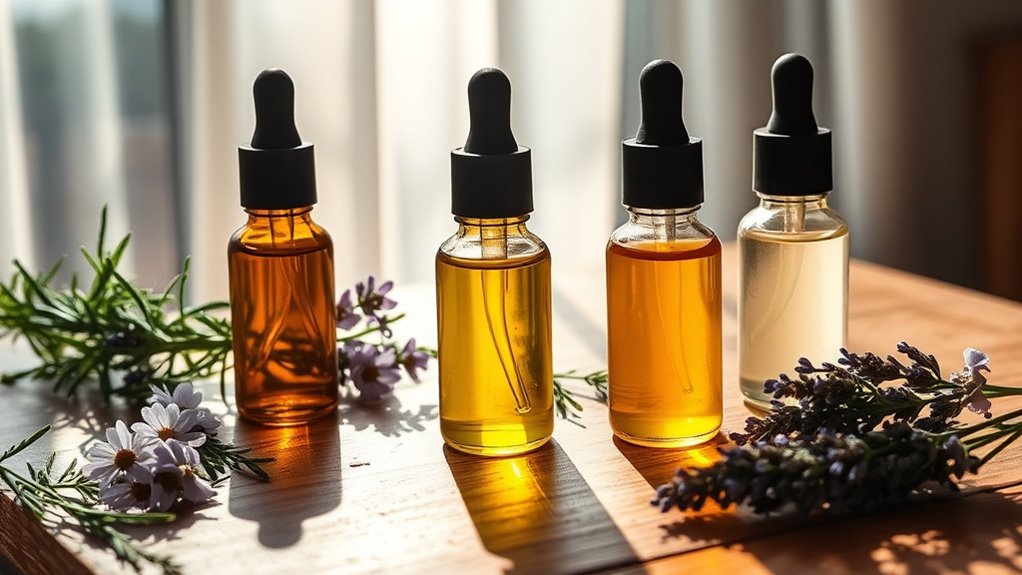Natural Oils That Work Wonders for Dry or Oily Skin
Natural oils offer targeted solutions for your skin’s unique needs, whether it’s dry or oily. Coconut oil deeply hydrates while enhancing your skin barrier, making it ideal for arid areas. Jojoba oil mimics your skin’s natural sebum, preventing pore-clogging. Argan oil improves elasticity and texture, combating dryness effectively. On the other hand, tea tree oil helps regulate excess oil production and acne. Exploring these oils can transform your skincare routine. So, which oil will you choose first?
Coconut Oil: A Versatile Moisturizer
Coconut oil, with its unique chemical composition, serves as a versatile moisturizer that benefits all skin types.
Its medium-chain fatty acids, like lauric acid, effectively penetrate the skin, providing hydration and enhancing the skin’s barrier.
As one of the most accessible natural oils for skin, it also possesses antibacterial properties, making it ideal for reducing irritation and promoting overall skin health. Additionally, coconut oil can be combined with Hyaluronic Acid’s benefits to boost moisture retention and achieve a radiant complexion.
Jojoba Oil: Mimicking Skin’s Natural Oils
As you explore natural oils for skin care, you may find that jojoba oil stands out due to its ability to closely mimic the skin’s natural sebum. This unique property allows it to moisturize effectively without clogging pores. Here’s a quick comparison of jojoba oil’s benefits:
| Feature | Jojoba Oil | Skin Benefit |
|---|---|---|
| Composition | Similar to sebum | Non-comedogenic |
| Hydration | Deeply hydrating | Prevents dryness |
| Compatibility | All skin types | Balances oily skin |
In addition to its moisturizing properties, jojoba oil is rich in essential fatty acids, which further support skin health and enhance its barrier function.
Argan Oil: Nutrient-Rich Solution for Skin
While many oils offer benefits for skin care, argan oil stands out as a nutrient-rich solution packed with essential fatty acids, antioxidants, and vitamin E. This combination enhances skin hydration, elasticity, and overall appearance. By incorporating argan oil into your routine, you can combat dryness, improve texture, and protect against environmental damage effectively, making it a versatile choice for various skin types. Additionally, it is known that collagen production can be further supported by incorporating foods rich in nutrients alongside topical treatments.
Tea Tree Oil: Balancing Oily Complexions
For those with oily complexions, tea tree oil offers an effective solution to help balance skin’s natural oil production.
This essential oil possesses antimicrobial properties that can reduce acne-causing bacteria and minimize inflammation.
By applying diluted tea tree oil topically, you can regulate excess sebum, resulting in a clearer, healthier complexion.
Regular use may lead to significant improvements in overall skin appearance. Additionally, it’s important to incorporate a consistent skincare routine to enhance the effectiveness of tea tree oil in managing oily skin.
Rosehip Oil: Healing and Rejuvenating Properties
Rosehip oil is a powerhouse of healing and rejuvenating properties, making it a favorite among skincare enthusiasts.
Rich in vitamins A, C, and essential fatty acids, it helps improve skin texture and reduce the appearance of scars.
Its antioxidant content protects against environmental damage, while its anti-inflammatory properties soothe irritation, promoting overall skin health.
You’ll love the glow it brings!
Sweet Almond Oil: Gentle Nourishment for All Skin Types
Sweet almond oil serves as an excellent option for achieving gentle nourishment across all skin types, thanks to its emollient properties and rich nutrient profile.
It’s rich in vitamin E, fatty acids, and antioxidants, effectively hydrating and soothing the skin.
Whether you have dry, oily, or sensitive skin, incorporating sweet almond oil into your routine can enhance moisture retention and maintain skin balance. Additionally, using cold compresses can further help soothe skin irritation when combined with its moisturizing effects.





